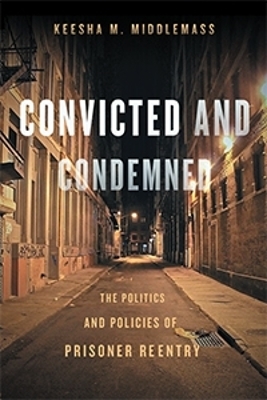
Convicted and Condemned
The Politics and Policies of Prisoner Reentry
Seiten
2017
New York University Press (Verlag)
978-0-8147-2439-2 (ISBN)
New York University Press (Verlag)
978-0-8147-2439-2 (ISBN)
- Lieferbar (Termin unbekannt)
- Versandkostenfrei
- Auch auf Rechnung
- Artikel merken
Winner, W. E. B. DuBois Distinguished Book Award presented by the National Conference of Black Political Scientists
Examines the lifelong consequences of a felony conviction through the compelling words of former prisoners
Felony convictions restrict social interactions and hinder felons’ efforts to reintegrate into society. The educational and vocational training offered in many prisons are typically not recognized by accredited educational institutions as acceptable course work or by employers as valid work experience, making it difficult for recently-released prisoners to find jobs. Families often will not or cannot allow their formerly incarcerated relatives to live with them. In many states, those with felony convictions cannot receive financial aid for further education, vote in elections, receive welfare benefits, or live in public housing. In short, they are not treated as full citizens, and every year, hundreds of thousands of people released from prison are forced to live on the margins of society.
Convicted and Condemned explores the issue of prisoner reentry from the felons’ perspective. It features the voices of formerly incarcerated felons as they attempt to reconnect with family, learn how to acclimate to society, try to secure housing, find a job, and complete a host of other important goals. By examining national housing, education and employment policies implemented at the state and local levels, Keesha Middlemass shows how the law challenges and undermines prisoner reentry and creates second-class citizens.
Even if the criminal justice system never convicted another person of a felony, millions of women and men would still have to figure out how to reenter society, essentially on their own. A sobering account of the after-effects of mass incarceration, Convicted and Condemned is a powerful exploration of how individuals, and society as a whole, suffer when a felony conviction exacts a punishment that never ends.
Examines the lifelong consequences of a felony conviction through the compelling words of former prisoners
Felony convictions restrict social interactions and hinder felons’ efforts to reintegrate into society. The educational and vocational training offered in many prisons are typically not recognized by accredited educational institutions as acceptable course work or by employers as valid work experience, making it difficult for recently-released prisoners to find jobs. Families often will not or cannot allow their formerly incarcerated relatives to live with them. In many states, those with felony convictions cannot receive financial aid for further education, vote in elections, receive welfare benefits, or live in public housing. In short, they are not treated as full citizens, and every year, hundreds of thousands of people released from prison are forced to live on the margins of society.
Convicted and Condemned explores the issue of prisoner reentry from the felons’ perspective. It features the voices of formerly incarcerated felons as they attempt to reconnect with family, learn how to acclimate to society, try to secure housing, find a job, and complete a host of other important goals. By examining national housing, education and employment policies implemented at the state and local levels, Keesha Middlemass shows how the law challenges and undermines prisoner reentry and creates second-class citizens.
Even if the criminal justice system never convicted another person of a felony, millions of women and men would still have to figure out how to reenter society, essentially on their own. A sobering account of the after-effects of mass incarceration, Convicted and Condemned is a powerful exploration of how individuals, and society as a whole, suffer when a felony conviction exacts a punishment that never ends.
Keesha M. Middlemass is Assistant Professor of Political Science at Trinity University where she researches topics at the intersection of race, institutions and public policies. Her scholarship is published in Punishment & Society, The Prison Journal, Aggressive Behavior, Criminal Justice & Behavior and Social Science Quarterly.
| Erscheinungsdatum | 04.07.2017 |
|---|---|
| Verlagsort | New York |
| Sprache | englisch |
| Maße | 152 x 229 mm |
| Gewicht | 590 g |
| Themenwelt | Recht / Steuern ► Strafrecht ► Kriminologie |
| Sozialwissenschaften ► Soziologie ► Allgemeine Soziologie | |
| ISBN-10 | 0-8147-2439-6 / 0814724396 |
| ISBN-13 | 978-0-8147-2439-2 / 9780814724392 |
| Zustand | Neuware |
| Informationen gemäß Produktsicherheitsverordnung (GPSR) | |
| Haben Sie eine Frage zum Produkt? |
Mehr entdecken
aus dem Bereich
aus dem Bereich
klare Antworten aus erster Hand
Buch | Softcover (2023)
UTB (Verlag)
CHF 27,85


